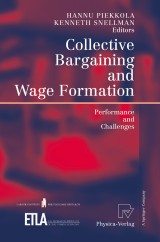Details

Collective Bargaining and Wage Formation
Performance and Challenges|
96,29 € |
|
| Verlag: | Physica-Verlag |
| Format: | |
| Veröffentl.: | 06.12.2005 |
| ISBN/EAN: | 9783790815986 |
| Sprache: | englisch |
| Anzahl Seiten: | 186 |
Dieses eBook enthält ein Wasserzeichen.
Beschreibungen
Hannu Piekkola and Kenneth Snellman ETLA, The Research Institute of the Finnish Economy, Helsinki, Finland The Labour Institute for Economic Research, Helsinki, Finland 1 The Basic Issues Wages have traditionally been agreed on collectively in Europe. The articles in this volume examine the current state of collective bargaining as well as the ch- lenges it is currently facing. The issues examined in these papers have a wide applicability to problems on the European labour markets. Torben M. Andersen and Steinar Holden review challenges from globalisation and inter-industry trade and the adaptation to a low-inflation environment. The other contributions are part of the project investigating collective bargaining in Finland, carried out by ETLA (the Research Institute of the Finnish Economy) and the Labour Institute for E- nomic Research. Some of them use results from a Finnish survey carried out by the two institutes ETLA and the Labour Institute on the views of employers and employees about labour relations and the labour market negotiation system. Bargaining systems are complex and their future development depends on their historical evolution, recent and past experiences, and the current situation in the labour market, as well as changes in the international environment. By examining the past functioning of the bargaining system one can observe how different e- ments in it have interacted with various factors in the environment of the system.
and Summary.- International Product Market Integration and Wage Bargaining.- Comment on Torben M. Andersen's Paper.- Wage Formation under Low Inflation.- Comment on Steinar Holden's Paper.- The Finnish Bargaining System: Actors' Perceptions.- Productivity, Incentives and Relative Wages.- Local Bargaining and Employers' Co-operation Options.- Do Centralized Bargains Lead to Wage Moderation? Time-Series Evidence from Finland.- Finnish Wage Bargaining — Actual Behaviour and Preferences.- Is the Labour Share Too Low in Finland?.- Bargaining on Pensions: The Finnish Pension Reform of 2001–2002.
<P>This volume considers the development of the wage formation and wage bargaining institutions as a response to changes in the bargaining environment. These changes include a lower level of inflation and the growth in intraindustrial trade as firms have become more specialised. The response to these changes will depend on the current institutions and on the characteristics of the bargaining system. Generally there has been some move towards decentralisation; the question is what should be bargained centrally and which issues should be transferred to lower levels. Some of the contributions pay special attention to Nordic regimes using survey results gathered from the Finnish labour market partners.</P>
Includes supplementary material: sn.pub/extras
Diese Produkte könnten Sie auch interessieren:

Zur Begründung eines progressiven Einkommensteuertarifs aus der Perspektive der Gleichmäßigkeit der Besteuerung

von: Mark Heitfeldt

59,99 €

Municipal Finances and the Adoption of Participatory Budgeting in Germany

von: Janina Apostolou

96,29 €














